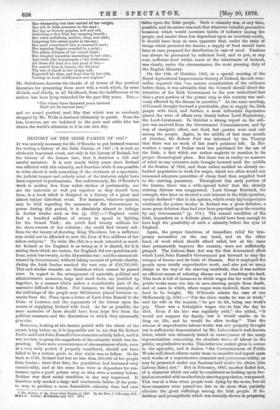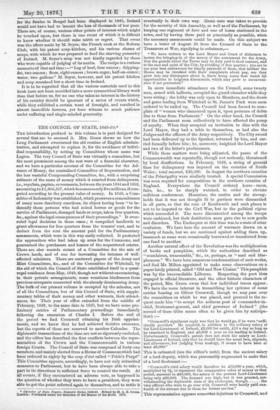HISTORY OF THE IRISH FAMINE OF 1847.*
Jr was scarcely necessary for Mr. O'Rourke to put forward reasons for writing a history of the Irish Famine of 1847; it is such an obviously important event, not only in the history of Ireland, but the history of the human race, that it deserves a full and careful narrative. It is now nearly thirty years since Ireland was afflicted with this calamity, and therefore while it was possible to write about it with something of the vividness of a spectator, the judicial temper and orderly mind of the historian might have been expected to predominate. But unfortunately, Mr. O'Rourke's work is neither free from unfair strokes of partisanship, nor are the materials so well put together as they should have been, in a book which is designed as a history of a great and almost unique historical event. For instance, whatever opinion may be held regarding the measures of the Government in power during this period, it is absolutely absurd to indulge in foolish tirades such as this (p. 162) :—" England could find a hundted millions of money to spend in fighting for the Grand Turk ; she could find twenty millions for the slave-owners of her colonies ; she could find twenty mil- lions for the luxury of shooting King Theodore, but a sufficient sum could not be afforded to save the lives of five millions of her fellow-subjects." To write like this in a work intended as much for Ireland as for England is as wrong as it is absurd, for it is stating facts which are untrue, for England did not spend ten mil- lions, much less twenty, in the Abyssinian war ; and the amount ad- vanced by Government, without taking account of private charity, during the Irish famine reached the vast sum of £10,700,000. This and similar remarks are blemishes which cannot be passed over. In regard to the arrangement of materials, political and administrative measures, large and small facts, are jumbled up together, in a manner which makes a considerable part of the narrative difficult to follow. For instance, we find examples of the sufferings of the people near Skibbereen placed between re- marks from the Times upon a letter of Lord John Russell to the Duke of Leinster, and the arguments of the former upon the means of supplying Ireland with food. As far as possible, the mere narrative of facts should have been kept free from the political measures and the discussions to which they necessarily give rise.
However, looking at the famine period with the whole of the events lying before us, it is impossible not to see that Sir Robert Peel's and Lord John Russell's Governments entirely failed, until it was too late, to grasp the magnitude of the calamity which was im- pending. There were a concurrence of circumstances which, even at a very early period, if properly considered, should not have failed to be a certain guide to that which was to follow. So far back as 1740, Ireland had lost no less than 200,000 of her people from famine ; since that date, the population had increased very considerably, and at the same time were as dependent for sus- tenance upon a good potato crop as they were a century before. Neither was their social condition in any way improved. It therefore only needed a large and continuous failure of the pota- to crop to produce a more formidable calamity than had ever • The litstory of the Great Irish Famine of 1847. By the Rey. J. O'Rourke, P.P., MAXI, Dublin: 4143/1aahan and Gil. 1875. decision and promptitude which was recently shown in preparing
fallen upon the Irish people. Such a calamity was, at any time, possible, and its nature was such that whatever valuable preventive measures which would inculcate habits of industry among the people, and render them less dependent upon an uncertain exotic, it should have been at once apparent that, under the state of things which preceded the famine, a supply of food should have been at once prepared for distribution in case of need. Famines can always be prevented by sufficient food, and to put, at any cost, sufficient food within reach of the inhabitants of Ireland, was clearly, under the circumstances, the most pressing duty of the English Ministry.
On the 18th of October, 1845, at a special meeting of the Royal Agricultural Improvement Society of Ireland, the sub-com- mittee reported that "on mature consideration of the evidence before them, it was advisable that the Council should direct the attention of the Irish Government to the now undoubted fact that a great portion of the potato crop in this country was seri- ously affected by the disease in question." At the same meeting, O'Connell brought forward a practicable plan to supply the Irish people with food, and further, a most influential deputation placed the state of affairs very clearly before Lord Heytesbury, the Lord-Lieutenant. In October a strong report on the sub- ject was received from the Government Commissioners, and by way of energetic effort, not food, but queries were sent out among the people. Again, in the middle of that same month of October, Sir Robert Peel was informed by the Viceroy that there was no stock of last year's potatoes left. In No- vember, a cargo of Indian meal was purchased for the use of the Irish, a fact which our author neglects to mention in its- proper chronological place. But there was in reality no measure of relief on any extensive scale brought forward until the middle of the Session of 1846, and these rather enabled an already en- feebled population to work for wages, which too often would not command adequate quantities of cheap food than supplied food to the starving peasantry. Throughout this early portion of the famine, there was a wide-spread belief that the already existing distress was exaggerated. Lord George Bentinck, for example, who later on showed a real interest in the Irish question, openly declared " that in his opinion, which every day's experience confirmed, the potato famine in Ireland was a gross delusion, a more gross delusion than had ever been practised upon the country by any Government." (p. 104.) The normal condition of the Irish, dependent on a delicate plant, should have been enough to have kept the possibility of such a calamity before the eyes of England.
Again, the proper functions of immediate relief for tem- porary necessities on the one hand, and on the other hand, of work which should afford relief, but at the same time permanently improve the country, were not sufficiently grasped. The Labour-Rate Act was the first determined effort which Lord John Russell's Government put forward to stay the ravages of famine and its train of diseases. But it employed the people upon totally unproductive work, and also put so many delays in the way of the starving multitude, that it was neither an efficient means of relieving disease nor of benefiting the land. This book is full of instances in which wages due for work on the public works came too late to save starving people from death, and of cases in which, where wages were received, there was no food to be bought. Mr. O'Rourke relates the case of one McKennedy (p. 258) :—" For the three weeks he was at work," said his wife at the inquest, "he got 2s. 6d., being one week's pay. There was a fortnight's wages due to him the day he died. Even if his hire was regularly paid," she added, "it would not support the family, but it would enable us to drag on life, and he would be alive to-day." That the scheme of unproductive labour-works was not properly thought out is sufficiently demonstrated by Mr. Labouchere's well-known letter, which was ultimately issued in consequence of the many representations concerning the absolute waste of labour in the public, unproductive works. This letter our author gives in extenso in the appendix, and it desires "the Commissioners of Public Works will direct officers under them to consider and report upon such works of a reproductive character and permanent utility, as may be presented under any Sessions held under the above (the Labour-Rite) Act." But in February, 1847, another Relief Act, of a character which can only be considered as looking upon Ire- land as crowded with an absolutely starving population, was passed. This was at a time when people were dying by the score, but all these measures were passed too late to do more than partially alleviate the great sufferings among the Irish people. If the
for the famine in Bengal had been displayed in 1845, Ireland would not have had to lament the loss of thousands of her poor. There are, of course, various other points of interest which might be touched upon, but there is one event of which it is difficult to know whether it should raise mirth or regret. That event was the effort made by M. Soyer, the French cook at the Reform Club, with his patent soup-kitchen, and his various classes of soups, with which he was prepared to feed the starving peasantry of Ireland. M. Soyer's soup was not kindly regarded by those who were capable of judging of its merits. The recipe is a curious memento of that sad time :—" Leg of beef, four ounces ; dripping- fat, two ounces ; flour, eight ounces ; brown sugar, half-an-ounce ; water, two gallons." M. Soyer, however, and his patent kitchen and soup remained but a short time in Ireland. It is to be regretted that all the various materials used in this book have not been moulded into a more symmetrical library work than that before us, for no one who takes an interest in the history of his country should be ignorant of a series of events which, while they exhibited a certain want of foresight, and resulted in almost incredible horrors, yet bore witness to much patience under suffering and single-minded generosity.































 Previous page
Previous page